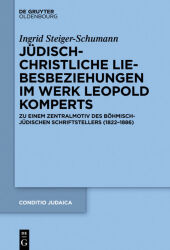 Neuerscheinungen 2015Stand: 2020-02-01 |
Schnellsuche
ISBN/Stichwort/Autor
|
Herderstraße 10
10625 Berlin
Tel.: 030 315 714 16
Fax 030 315 714 14
info@buchspektrum.de |

Ingrid Steiger-Schumann
Jüdisch-christliche Liebesbeziehungen im Werk Leopold Komperts
Zu einem Zentralmotiv des böhmisch-jüdischen Schriftstellers (1822-1886)
2015. XI, 362 S. 230 mm
Verlag/Jahr: OLDENBOURG 2015
ISBN: 3-11-043801-1 (3110438011)
Neue ISBN: 978-3-11-043801-7 (9783110438017)
Preis und Lieferzeit: Bitte klicken
Die 1992 gegründete Buchreihe ist interdisziplinär ausgerichtet; sie umfasst wissenschaftliche Monographien, Aufsatzsammlungen und kommentierte Quelleneditionen vom 18. Jahrhundert bis zur Gegenwart.
Der Begriff deutsch-jüdische Literatur bzw. Kultur verweist auf Werke jüdischer Autoren in deutscher Sprache, insoweit jüdische Aspekte erkennbar sind. Aber auch das häufig vom Antisemitismus geprägte Judenbild nichtjüdischer Autoren wird zu einem Faktor der literarisch vermittelten deutsch-jüdischen Beziehungsgeschichte. Der Erforschung des gesamten Problemfelds bietet die Reihe ein angemessenes Forum.
Die Erzählungen Komperts schildern atmosphärisch dicht das jüdische Leben in der böhmischen "Gasse". Sie sind von einer interkulturellen - sprachlichen, bildungsbezogenen, räumlichen und sozialen - Problematik der Liebesbeziehungen bestimmt. Im Roman "Zwischen Ruinen" (1875) glückt trotz psychologischer Hindernisse eine religionsübergreifende Eheverbindung, ermöglicht durch die neu eingeführte Ziviltrauung. Das steht exemplarisch für die von Kompert erhoffte Akkulturation an die christliche Mehrheitsgesellschaft bei gleichzeitiger Wahrung der jüdischen Identität. Voraussetzung dafür ist eine Religiosität, die am Wesentlichen festhält, aber flexibel auf die Erfordernisse der neuen Zeit reagiert. Allerdings ist Kompert nicht der Anwalt einer vollständigen Assimilation der Juden. Er plädiert für eine Gesellschaft, in der Majorität und Minorität, verschiedene Religionen und unterschiedliche kulturelle Traditionen nicht nur konfliktfrei Platz haben, sondern sich gegenseitig bereichern.
This book-series, initiated in 1992, has an interdisciplinary orientation; it comprises research monographs, collections of essays and annotated editions from the 18th century to the present. The term German-Jewish literature refers to the literary work of Jewish authors writing in German to the extent that Jewish aspects can be identified in these. However, the image of Jews among non-Jewish authors, often determined by anti-Semitism, is also a factor in the history of German-Jewish relations as reflected in literature. This series provides an appropriate forum for research into the whole problematic area.
This book-series, initiated in 1992, has an interdisciplinary orientation; it is published in English and German and comprises research monographs, collections of essays and editions of source texts dealing with German-Jewish literary and cultural history, in particular from the period covering the 18th to 20th centuries.
The closer definition of the term German-Jewish applied to literature and culture is an integral part of its historical development. Primarily, the decisive factor is that from the middle of the 18th century German gradually became the language of choice for Jews, and Jewish authors started writing in German, rather than Yiddish or Hebrew, even when they were articulating Jewish themes. This process is directly connected an historical change in mentality and social factors which led to a gradual opening towards a non-Jewish environment, which in its turn was becoming more open. In the Enlightenment, German society becomes the standard of reference - initially for an intellectual elite. Against this background, the term German-Jewish literature refers to the literary work of Jewish authors writing in German to the extent that explicit or implicit Jewish themes, motifs, modes of thought or models can be identified in them.
From the beginning of the 19th century at the latest, however, the image of Jews in the work of non-Jewish writers, determined mainly by anti-Semitism, becomes a factor in German-Jewish literature. There is a tension between Jewish writers´ authentic reference to Jewish traditions or existence and the anti-Semitic marking and discrimination against everything Jewish which determines the overall development of the history of German-Jewish literature and culture. This series provides an appropriate forum for research into the whole problematic area.


